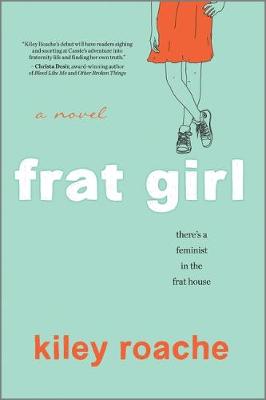Reviewed by girlinthepages on
First and foremost, I have to give this book major kudos for being set in college and COMMITTING to the setting. Often times college set YA books (of which there are few) often still have a high school vibe to them, but this really felt like a college setting- from the poor partying decisions and rowdy social life juxtaposed with though provoking academic conversations. It really captures that unique to college feeling of being simultaneously confident in your newfound adulthood and completely unsure of what to do with it. It was also set in the silicon valley (and very clearly based on Stanford University) and I loved the Northern California setting.
Where I struggle with Frat Girl is my mixed feelings of the portrayal of Greek life in college and the role it plays. As a former Greek myself, I know that many of the stereotypes can both be true and untrue, and are really dictated by which university, house, chapter, etc. you encounter. In the novel, pretty much every house (both fraternity and sorority) is portrayed as a party house. While the protagonist eventually learns over the course of the novel that students who participate in Greek life are more complex and human than she thought, I disliked that there wasn't more discussion surrounding houses that weren't on the verge of probation. Sure, most schools have at least one party heavy organization, but many houses are known for being academically inclined, or athletic, or even gentlemen. Same with sororities- not all are the frat obsessed partiers that many in this novel were painted to be. Some variety would have been nice in the portrayal of what Greek life is. I was also surprised that the book normalized hazing and it was never really addressed as problematic. I'm not naive- I know it happens- but I also know some schools and chapters have very rigid anti-hazing policies and stick to them. I suppose at the end of the day while the extreme partying of the houses in the story served a purpose for the plot, I felt like it gave a very one dimensional portrayal of Greek life.
The problematic Greek life in the story was often counteracted by protagonist Cassie's interest in feminism and gender studies, and while it felt a little heavy handed at times, I liked the awareness it created and how there were times in the story where even the protagonist would be called out for her biases despite how pro-feminism she was, even to the point where the girls who were in the sororities she judged so harshly confronted her (she was saying a lot of judgemental, toxic stuff about many of the sorority women on campus for a self proclaimed feminist). There was a lot of debate among the characters about the impact that Cassie's project was making- was it a great step in exposing sexism, or was it silly and a waste of resources when there are much worse crimes against women being committed around the world than a fraternity being disrespectful? In true college fashion, it causes its readers to think critically and doesn't take a stance on this issue one way or another really, which is what a good academic discussion does- encourages free thought and open discussion.
Though the story focuses heavily on Cassie's undercover project in the fraternity house, it also has a romance element to the plot that I actually enjoyed. It's fun in that it's illicit, but it also just felt like a very sincere courtship for early college- you have so much more agency and autonomy and it's not all holding hands in the hallway and locker kisses, but it's also full of the uncertainties of navigating a relationship where you have so much more power and free will. I really enjoyed the whole courtship and could definitely see the love interest being someone I would have liked in college, and therefore could find myself easily rooting for the relationship. However, there were times where the characters would go off on these weird existential tangents about love (or anxiety or depression) that didn't felt like they fit with the tone of the rest of the book, which was a bit more lighthearted.
At the end of the day Frat Girl is a read that's always going to stand out in my mind because it's not afraid to push the limits in the YA genre, being a true portrayal of college in all aspects from the romance to the partying to the academic discussion. While I did have some problems with the Greek life element, I found it hard to put down and a lot of the scenes hilarious yet relevant (like when Cassie teaches a sex-ed class to the guys in her chapter and debunks a lot of boy myths about female anatomy). However I ultimately wish there had been more closure at the end of the book, or more of a resolution as a result of Cassie's project- I felt like the guys didn't really change and become more open-minded so much as they learned to accept Cassie as an individual.
Overall: Frat Girl is a truly authentic college-feeling YA novel, which I'm always thrilled to see more of. While I had mixed feelings on its portrayal of Greek life, I loved the feminist themes and academic discussions in the book. If you're looking to read more YA set in college and want something fast paced and interesting, Frat Girl is definitely a book for you- just make sure you still keep an open mind about Greek life after reading it.
Reading updates
- Started reading
- 4 March, 2018: Finished reading
- 4 March, 2018: Reviewed
